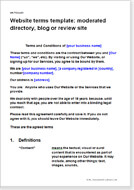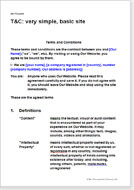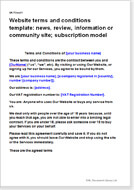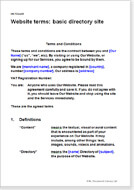Website terms & conditions: news, review and information sites
Website terms and conditions form the contract between you and your customers. Net Lawman T&C are clear, precise and complete. They should help protect your website from misuse and encourage visitors to become customers. The ones on this page are for online news and information sites, blogs, and product or service review sites.
Website terms template: moderated directory, blog or review site
These website terms are suitable for blogs, directories, review sites or information sites that do not require as strict terms regulating visitor contributed content. You might not ask visitors to contribute to your site, or you might moderate or approve content before it is published. Examples of such sites might be: personal or corporate blogs; directories (for example, of local attractions) where visitor contributed content is likely to be moderated and approved before publishing; or review sites (for example, of mobile telephone apps) where content is published by pre-approved writers.
Website terms: simple information site
This website T&C is for a very simple website with no e-commerce and no interaction by a visitor to enter data, upload, download or leave comments. Your site simply offers information: prices, contact information, match results, or any other.
Website terms and conditions template: news, review, information or community site; subscription model
These terms and conditions have been drawn for sites that provide access to digital content in return for a subscription fee. Examples of sites that would use this template would include: a technology news and review site where some content is available only to subscribers; a site that provides access to a library of company reports; and a site that provides access to a business forum to subscribers. The content could be generated by the site owner or by the community your site fosters. It includes strong protection of your site against malicious use and your intellectual property, whether generated by you or by your subscribers.
Website terms and conditions template: news, wiki or community site; free-to-access model
These terms and conditions have been drawn for a site that fosters an online community. A key differentiator of these terms from others is that there are no provisions for subscription, so although membership may be required for access, it is free. Examples of types of sites that might use it include: collaborative sites such as software development communities; wikis; user maintained directories; online fan clubs; and customer communities (such as those offering product support). The template includes strong protection of intellectual property, whether generated by you or by your subscribers.
Website terms: basic directory site
This website T&C is for a very simple directory website with no e-commerce and no interaction by a visitor to enter data, upload, download or leave comments. Your site simply offers information.

If the document isn’t right for your circumstances for any reason, just tell us and we’ll refund you in full immediately.

We avoid legal terminology unless necessary. Plain English makes our documents easy to understand, easy to edit and more likely to be accepted.

You don’t need legal knowledge to use our documents. We explain what to edit and how in the guidance notes included at the end of the document.

Email us with questions about editing your document. Use our Lawyer Assist service if you’d like our legal team to check your document will do as you intend.

Our documents comply with the latest relevant law. Our lawyers regularly review how new law affects each document in our library.
Terms and conditions that will protect your content
When you’re developing a website, it seems that there are a million and one tasks more important than writing your terms and conditions. However, they can be valuable in protecting the content you create and publish.
T&C are the agreement between you and your site visitor. Without them, it is much harder to protect your business if your site visitors behave in a way that is detrimental to it. That may be posting upsetting messages to your blog, or copying photographs or videos you have taken.
What you will find in our documents
All our T&C provide what could be called an Acceptable Use Policy, which sets out what visitors may and may not do when they interact with your site.
No term appears in every template we sell. Each document has been drawn to be relevant to the business we intend to protect.
Use of plain English strengthens the document
Consistent use of plain English and minimal “legalese” throughout helps because:
- you can set out clearly what your visitors can expect while on your site
- it prevent misunderstandings and makes solving disputes easier
- it makes a document easy for you to edit
Extensive guidance to help you edit the template
We include guidance notes that explain how to edit each paragraph. We know that there will be paragraphs that you will want to add to or edit because your site operates differently. There is no problem with that. We can also check your edits as part of our additional review service if you would like confirmation that they fit.
Restrictions on what a visitor may post to your website
Having strong security terms in a T&C document is not going to stop abuse, but it does:
- provide a deterrent to any misuse for which you could sue in court
- prevent you being blamed for criminal or nuisance activity
- reduce the chance of your being the subject of some bad social medium campaign - particularly important if your members can contribute content to your site that you might not moderate in real time
- present your site in a strong and purposeful way, giving out a message that you are not a “soft touch”
- assist in protecting you from civil or criminal charges for which you may otherwise be liable as a result of what someone else posts to your website
- provide permission for you to remove offensive content and generally stay in full control of what happens on your website
By using these provisions, we give you the best possible defence against anyone who claims he has been insulted, injured, or defamed.
Particular terms which are included where relevant.
Disclaimers
We provide disclaimers. They are not always binding because you can disclaim only so far as the law allows and the law is complicated. We use disclaimers strongly but we use words that we hope will avoid upsetting your visitors.
Intellectual property protection
We provide the strongest protection for your IP rights, whether your content is simply words on a page or videos, photographs and perhaps systems.
Suitable for sites with international visitors
Our documents are written to cover international use because most websites are likely to attract visitors from across the world.
Every document is drawn under the New Zealand Law and much is likely to be enforceable in many other legal jurisdictions as well.
Advertising
If you are in publishing, your business model might include taking advertising in some way. Our documents do not regulate the terms of any advertising. That deal is between you and your advertiser, rather than between you and your visitors. But we do include general terms intended to protect you from a claim by a site user in respect of anything he or she might claim against you.
Basis of Contract
A contract is only formed if your visitor ticks a box to do so explicitly. No tick, no contract. Unless your website requires registration, you are unlikely to form a contract with a visitor.
So if you have a site that is entirely open to use, or even pages than can be explored before registration, it cannot be fully protected by any T&C document. Despite that principle, there are circumstances in which you could claim that your T&Cs apply, so it is always worth having them.
All rights reserved





